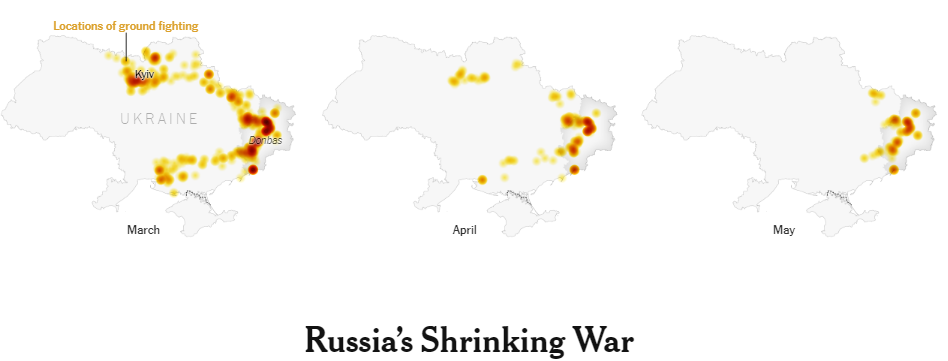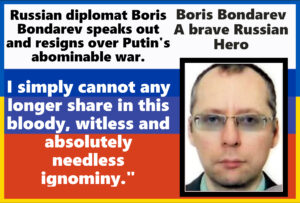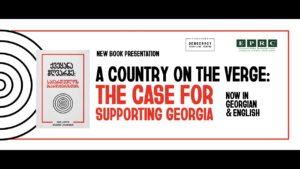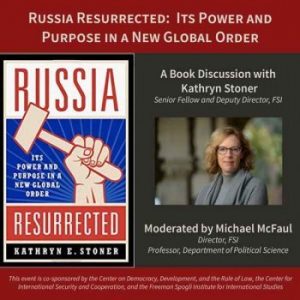
Credit: NYT Screen capture
The goals of Russia’s invasion keep getting smaller. But its depleted military is still failing to make major advances, and time is on Ukraine’s side, Josh Holder, Marco Hernandez and write for The New York Times.
Liberal billionaire George Soros on Tuesday said Russia’s invasion of Ukraine could be looked back on as the starting point of World War III.
“Russia invaded Ukraine. This has shaken Europe to its core,” he told the World Economic Forum. “The European Union was established to prevent such a thing from happening. Even when the fighting stops, as it eventually must, the situation will never revert to the status quo ante. Indeed, the Russian invasion may turn out to be the beginning of World War III, and our civilization may not survive it.”
Former U.S. secretary of state Henry A. Kissinger said Monday that Ukraine should concede territory to Russia to help end the invasion, suggesting a position that a vast majority of Ukrainians are against as the war enters its fourth month, The Washington Post reports.
 A poll conducted by the Kyiv International Institute of Sociology (right) this month found that 82 percent of Ukrainians are not prepared to give up any of Ukraine’s land, even if it means the war will drag on. Only 10 percent believe that giving up land is worth it to end the invasion, while 8 percent were undecided, according to the poll conducted between May 13 and last Wednesday, the Post adds.
A poll conducted by the Kyiv International Institute of Sociology (right) this month found that 82 percent of Ukrainians are not prepared to give up any of Ukraine’s land, even if it means the war will drag on. Only 10 percent believe that giving up land is worth it to end the invasion, while 8 percent were undecided, according to the poll conducted between May 13 and last Wednesday, the Post adds.
“As easily as Mr. #Kissinger proposes to give [Russia] part of [Ukraine] to stop the war, he would allow to take Poland or Lithuania away,” said Zelensky adviser Mykhailo Podolyak (below). “It’s good that Ukrainians in the trenches do not have time for listening to ‘Davos panickers.’ They’re a little bit busy defending Freedom and Democracy.”
The war in Ukraine is really about Vladimir Putin’s effort to stay in power amid a stagnating economy and gathering public discontent, and a lack of an ideology to mobilize the masses, according to Boris Bondarev, a diplomat at Russia’s United Nations mission in Geneva, who on Monday became the most prominent Russian official to resign and publicly criticize the war in Ukraine since the invasion on Feb. 24, The Times reports.
“How can you stay and preserve power, without losing it in the face of such objective difficulties?” he asked in an email to colleagues. “You have to invent a war.”
“For 20 years of my diplomatic career I have seen different turns of our foreign policy but never have I been so ashamed of my country as on Feb. 24 of this year,” he added. Putin could have spent the last two decades “developing the country” but instead turned it “into some kind of total horror, a threat to the world.”

Twitter screen grab
“Those who conceived this war want only one thing — to remain in power forever, live in pompous tasteless palaces, sail on yachts comparable in tonnage and cost to the entire Russian Navy, enjoying unlimited power and complete impunity,” Mr. Bondarev said in his email. “To achieve that they are willing to sacrifice as many lives as it takes.”
In a joint letter released yesterday by the Council of Russian human rights defenders,* Russian civil society organizations and human rights defenders called on the UN Human Rights Council to promptly appoint a Special Rapporteur on the human rights situation in the Russian Federation.
Bondarev’s very public resignation led to calls for other Russian officials to follow suit, The Post adds.
“Boris Bondarev is a hero,” said Hillel Neuer, executive director of U.N. Watch, a Geneva-based nongovernmental organization, who circulated a copy of the Russian diplomat’s letter on Twitter. “We are now calling on all other Russian diplomats at the United Nations—and worldwide—to follow his moral example and resign.”
BREAKING: 🇷🇺 Russia’s Counsellor to the United Nations in Geneva has resigned.
Boris Bondarev: “Never have I been so ashamed of my country.”
UN Watch is now calling on all other Russian diplomats at the United Nations—and worldwide—to follow his moral example and resign.
— Hillel Neuer (@HillelNeuer) May 23, 2022
Democracy the best antidote
Kissinger’s comments come as world leaders say Russia’s war in Ukraine has thrown the “whole international order into question.” European Commission President Ursula von der Leyen told global leaders in Davos that Russia could one day recover its place in Europe if it “finds its way back to democracy, the rule of law and respect for the international rules-based order … because Russia is our neighbor.”
There was an idea in certain circles that anyone who wanted to see Russia modernize should actually back Putin, because truly free elections would bring to power unfettered ultranationalists, notes Carnegie analyst Andrei Kolesnikov. Needless to say, quite the opposite has happened. Democracy, the rotation of power, and accountability are the best defenses against this kind of scenario, he writes in an article originally published in Russian in the New Times.
Putin no longer sees Russia as part of the global order for which Europeans fought for generations, argues historian and political scientist Joshua Kroeker. Ukrainian democracy and its pivot to the West is, for him, threatening on a personal level. It threatens his image of a new Russia, for which he has rewritten history, undermined all democratic standards and rejected the entire western world. It is Putin’s ideal, his Weltbild, which has brought us here today, he writes for New Eastern Europe.
 Particularly since the crisis in Ukraine, Georgia’s governance has increasingly resembled the Russian model, complete with one-party rule and persecution of the opposition. The United States and its European allies need to exercise influence with Georgia to help rein in these destructive forces, add Ian Kelly and David J. Kramer, authors of a recent report from the German Marshall Fund and the Economic Policy Research Center in Tbilisi, A Country on the Verge: The Case for Supporting Georgia.
Particularly since the crisis in Ukraine, Georgia’s governance has increasingly resembled the Russian model, complete with one-party rule and persecution of the opposition. The United States and its European allies need to exercise influence with Georgia to help rein in these destructive forces, add Ian Kelly and David J. Kramer, authors of a recent report from the German Marshall Fund and the Economic Policy Research Center in Tbilisi, A Country on the Verge: The Case for Supporting Georgia.
Along Russia’s periphery are a number of compliant regimes, fearful of cooperating with the EU and NATO and provoking Putin’s ire. It is not too late to prevent Georgia from becoming another such regime, they write for The Bulwark.
Ukraine is the only country in the world to stage two popular, revolutionary movements within the span of a decade – 2004 with the Orange Revolution and 2013-14 with the Revolution of Dignity – in support of democracy, a Euro–Atlantic orientation, an end to corruption, and an escape from being under the Russian thumb, adds Kramer, editor of the Bush Center’s Catalyst.
Russia’s strategic mistake in Ukraine is partly due to the fact that Putin was given intelligence indicating that President Zelensky would quickly leave, that Russian tanks would be welcomed by Ukrainian people being held hostage by corrupt Ukrainian elites who’d been bought off by the West, notes Kathryn Stoner, the Mosbacher Director at the Center on Democracy, Development and the Rule of Law, a professor of political science at Stanford University, and a senior fellow at the Hoover Institution.

Credit: Stanford CREEES
That reflects that there’s a problem with autocracies as there is sometimes, as we saw in Iraq, with democracies where you don’t want to believe disconfirming evidence or it gets discounted. I think that in an autocracy that problem is even more acute, because no one wants to bring Mr. Putin something that would be disconfirming, she tells Democracy Paradox, drawing on her article, “How Putin’s War Has Ruined Russia,” recently published at journalofdemocracy.org.
Her assessment tallies with that of dissenting Russia diplomat Bondarev.
“They got Ukraine wrong, they got the West wrong, they basically got everything wrong,” he said. “We diplomats of the Foreign Ministry are also at fault for this, for not passing along the information that we should have — for smoothing it out and presenting it as though everything was great.”
“Instead of presenting your own analysis as objectively as possible along with your suggestions on how to proceed, we often presented information that was certain to be liked,” he said. “That was the main criterion.”
Badge of honor
National Endowment for Democracy President and CEO Damon Wilson, NED vice president Christopher Walker, NED chairman Ken Wollack and former NED president Carl Gershman made the list of honor of people banned from Russia by the Kremlin this week. They were joined by other democracy advocates and Russia analysts, including Laura Jewett, Regional Director for Eurasia at the National Democratic Institute, Stanford University’s Michael McFaul and Mark Green, a former president of the International Republican Institute.
As easily as Mr. #Kissinger proposes to give 🇷🇺 part of 🇺🇦 to stop the war, he would allow to take Poland or Lithuania away. It’s good that Ukrainians in the trenches do not have time for listening to “Davos panickers”. They’re a little bit busy defending Freedom and Democracy. pic.twitter.com/2zraPDummx
— Михайло Подоляк (@Podolyak_M) May 24, 2022
*The Council of Russian human rights defenders
- Galina Arapova
- Svetlana Astrakhantseva
- Valery Borshchev
- Svetlana Gannushkina
- Sergey Davidis
- Jury Dzhibladze
- Sergey Lukashevsky
- Oleg Orlov
- Lev Ponomaryov
- Olga Sadovskaya
- Natalya Taubina
- Alexander Cherkasov
- Yelena Shakhova
Supported by
- The Committee Against Torture
- Moscow Helsinki Group
- Public Verdict Foundation
- St. Petersburg Human Rights Council
- Sakharov Centre
- Sova Centre for Information and Analysis
- Support Programme for Environmental Activists of the Russian Social Ecological Union
- Environmental Crisis Group
- Olga Alekseyeva, a human rights defender
- Natalya Yevdokimova, a human rights defender
- Larisa Zakharova, a human rights defender
- Leonid Krikun, a lawyer
- Lev Levinson, a human rights defender
- Oksana Paramonova, a human rights defender
- Ella Polyakova, a human rights defender
- Alexei Sokolov, a human rights defender
- Andrey Suslov, a human rights defender
- Valentina Cherevatenko, a human rights defender







